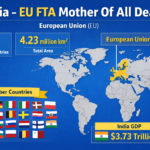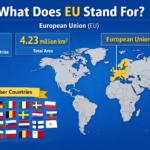Climate Change & India’s Heatwaves: Basics Explained

India , in the current summer, has been battling probably the worst heatwave in its history.
- March has been recorded as the hottest in 122 years from 1901-2022. April was not far behind, with Northwest and Central India being the hottest in the same time period. Overall, it was the fourth hottest April the country has witnessed. March recorded three days of heatwave against the normal of one day.
- April registered 10 days of heatwave against the average of three days. It is not only the intensity of the heatwave but also its prolonged duration this season.
- The long persistence of heatwaves has highlighted global warming’s cascading effect on the temperature profile across the country. Both the frequency and intensity have increased sharply over the last few decades.
- According to the Ministry of Earth Sciences report, ‘Assessment of Climate Change over the Indian Region’, India’s average frequency of summer heatwaves will increase to about 2.5 events per season by the mid-21st century under the medium emission scenario.
- Recently released IPCC WG2 Report ‘Climate Change 2022: Impacts, Adaptation and Vulnerability’ warned, that we are moving to tougher times ahead as heatwaves will continue to become more frequent, harsher and prolonged.
Other Parameters linkages with Climate Change in India
Climate change has led to dynamic changes in the pattern of Western Disturbance(WD). Although the frequency of WD has increased, it has not translated to the precipitation associated with them; they are very crucial in the summer season as they are known to suppress heatwave conditions in the Indo-Gangetic plains.
The formation of anticyclones was nothing abnormal as they usually develop over Northwest India during summers. However, it is the longer persistence of these anticyclones that exaggerated the heatwave conditions in India. This is another indirect impact of changing climatic conditions.
Above normal temperatures across the Arctic region is a major cause of concern as it directly impacts the circulations affecting the Asia region. If the Arctic heatwave continues, we might see a greater number of hotter days quite early in the season, with their potential impact on WDs.
LEARNING FROM HOME/WITHOUT CLASSES/BASICS
Qualitatively, heatwave is a condition of air temperature which becomes fatal to human body when exposed. Quantitatively, it is defined based on the temperature thresholds over a region in terms of actual temperature or its departure from normal. The Indian Meteorological Department (IMD) has given the following criteria for Heat Waves :
Heat Wave need not be considered till the maximum temperature of a station reaches at least 40°C for Plains and at least 30°C for Hilly regions
When the normal maximum temperature of a station is less than or equal to 40°C Heat Wave Departure from normal is 5°C to 6°C Severe Heat Wave Departure from normal is 7°C or more
When the normal maximum temperature of a station is more than 40°C Heat Wave Departure from normal is 4°C to 5°C Severe Heat Wave Departure from normal is 6°C or more
When the actual maximum temperature remains 45°C or more irrespective of the normal maximum temperature, heat waves should be declared.
ANTHROPOGENIC CLIMATE CHANGE is a change caused by human activity.
CLIMATE CHANGE: Climate Change refers to any change in climate over time whether due to natural variability or as a result of human activity.
Global warming is the long-term heating of Earth’s climate system observed since the pre-industrial period (between 1850 and 1900) due to human activities, primarily fossil fuel burning, which increases heat-trapping greenhouse gas levels in Earth’s atmosphere. The term is frequently used interchangeably with the term climate change, though the latter refers to both human- and naturally produced warming and the effects it has on our planet.
Greenhouse gases allow sunlight (shortwave radiation) to pass through the atmosphere freely, where it is then partially absorbed by the surface of the Earth. Greenhouse gases are able to trap heat (longwave radiation) in the atmosphere, keeping the Earth’s surface warmer than it would be if they were not present. These gases are the fundamental cause of the greenhouse effect. Increases in the number of greenhouse gases in the atmosphere enhances the greenhouse effect which is creating global warming and consequently climate change.
So the more greenhouse gases you have in the atmosphere, the more heat stays on Earth. The principal forcing greenhouse gases are:
Carbon dioxide (CO2); Methane (CH4); Nitrous oxide (N2O); Fluorinated gases
UNFCCC
The UNFCCC entered into force on 21 March 1994. Today, it has near-universal membership. The 197 countries that have ratified the Convention are called Parties to the Convention.
The UNFCCC is a “Rio Convention”, one of three adopted at the “Rio Earth Summit” in 1992. Preventing “dangerous” human interference with the climate system is the ultimate aim of the UNFCCC. The ultimate objective of the Convention is to stabilize greenhouse gas concentrations “at a level that would prevent dangerous anthropogenic (human induced) interference with the climate system.”
PARIS AGREEMENT
The Paris Agreement is an agreement within the United Nations Framework Convention on Climate Change (UNFCCC) dealing with greenhouse gas emissions, mitigation and adaptation. The Paris agreement was signed in 2015 by 195 countries. The Paris Agreement entered into force on 4 November 2016. the Paris Agreement mandates all countries to take action to minimise the impact of climate change as per their voluntary commitments and individual capacity.
It sets a global goal of keeping global average temperatures from rising 2°C (compared to temperatures of pre-Industrial Revolution) by the end of the century.



0 Comments